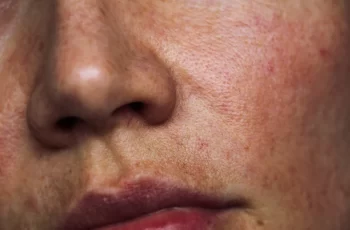
The Science of Cocoa Butter in Skin Care
Cocoa butter is a good ingredient for dry and resistant skin types. Cocoa butter has anti-inflammatory, moisturizing, antioxidant, and UV protective qualities. When not processed for cosmetic formulations, this ingredient dries into a solid resembling dairy butter.
This ingredient is super comedogenic and will cause acne on the face of sensitive skin types if not thoroughly washed off with a cleanser. Despite this drawback, there are still many interesting uses for cocoa butter in skin care.
To see if cocoa butter is right for your skin type, take our skin care quiz to get your Baumann Skin Type and a custom skin care regimen recommendation for free!
What is Cocoa Butter Made of?
Cocoa butter is a thick oil mostly composed of saturated fatty acids like palmitic and stearic acids. It also contains small concentration of linoleic, a-linolenic, and oleic fatty acids.
Palmitic acids and stearic acids are highly comedogenic saturated fats, meaning they can easily clog the pores of sensitive skin. In dry, resistant skin types, their ability to hold moisture onto the skin and repair the skin barrier might not result in acne.
Besides lipids, this ingredient is also rich in versatile polyphenolic compounds, minerals, and more. (1,6)
Some of the most notable components of cocoa butter include:
Caffeine – an antioxidant and vasorestrictor.(5)
Catechins – UV protective qualities and antioxidant activity (2)
Flavanols – a group of polyphenolic compounds found in many plants like green tea
Theobromine – a methylxanthine like caffeine (3)
Vitamin E – one of the most well studied antioxidants in skin care. (4)
Skin Benefits
If cocoa butter is right for your skin type, benefits of using it in your regimen can offer anti-inflammatory, moisturizing, and sun protective qualities.
If you are not prone to acne breakouts, and know you have a dry, resistant Baumann Skin Type,this ingredient could be a good addition in your moisturizing products.
When used on the arms or legs, there is not really a concern for acne, so cocoa butter can be included in body moisturizers without risks of causing acne in most cases.
is it good to use cocoa butter in skin care?
Is Cocoa Butter Good for Skin?
Cocoa butter has a few positive attributes for skin care, but it is only suitable for dry, resistant skin. If you do have dry, resistant skin, this ingredient can great for inflammation, repairing the skin barrier, and holding moisture onto the skin with its thick, occlusive texture. It also contains antioxidants and UV protective capabilities that make it good for both preventing and treating sun damage.
If you are not using cocoa butter on parts of the body prone to acne, it can be a solid choice as well.
If your skin is oily or sensitive, cocoa butter contains a high concentration of comedogenic fatty acids that are known to clog pores in acne prone skin. (7)
While it might be great for moisturizing, and have some antioxidant benefits, it is not right for most skin types.
Is it safe?
Cocoa butter is considered safe for use in cosmetics by organizations like the Environmental Working Group (EWG), but more research on this ingredient is still required.
There is surprisingly little research onthis ingredient’s use in cosmetics, but it is known to clog pores because of its comedogenic fatty acids, so it is not good for use on sensitive, oily skin.
Additionally, over moisturizing the skin can result in a change of the face’s natural microbiome, which can result in various kinds of acne including cysts.
Cocoa butter in skin care and acne
Cocoa Butter and Acne
Cocoa butter is extremely comedogenic and will clog the pores of acne prone skin types. We do not recommend using this ingredient for any acne treatment as it and other comedogenic ingredients only make acne worse. Instead of cocoa butter for acne care, consider cleansers, peels, and other products designed specifically to treat acne.
Some common ingredients you can read about on our website that are typically great for acne care are:
Benzoyl peroxide
Glycolic acid
Retinoids
Salicylic acid
Raw Cocoa Butter
When you see cocoa butter in your skin care products, it is typically raw cocoa butter.
Cocoa butter is usually derived in the chocolate making process by treating fermented cacao beans with pressure and various other mechanical extraction methods.(6)
It is not a synthetic ingredient and is not typically heated to a temperature that denatures its beneficial enzymes when it is being used for skin care.
cocoa butter in skin care for inflammation
For Inflammation
Cocoa butter is great for inflammation control in dry, resistant skin types. Cocoa butter contains a few unsaturated fatty acids like linoleic and a-linolenic fatty acids which are good for repairing the skin barrier. (1,6,7)
The antioxidants in cocoa butter also help it alleviate inflammation from oxidative stress. Skin conditions where the skin barrier is dry and irritated like eczema can benefit from the occlusive, anti-inflammatory nature of this ingredient.
If you need an anti-inflammatory but you are prone to acne, check out this list of anti-inflammatory ingredients in skin care!
For Anti-Aging
Cocoa butter contains a decent amount of antioxidant components such as the various polyphenols, vitamin E, and caffeine. (1) Antioxidants are essential for eliminating free radicals on the skin. Free radicals can cause genetic damage within skin cells which can lead to conditions ranging from sunburns and wrinkles to skin cancer. (8)
In addition to binding free radicals, some of the components in cocoa butter are known to absorb UV radiation (2,3,6).
Cocoa butter alone is not enough to protect your skin from aging. For a full list of anti-aging ingredients, check out this library!
Best cocoa butter creams in skin care
Best Cocoa Butter Creams
The most common use of cocoa butter in skin care products is in thick, occlusive moisturizing creams for dry, resistant skin types. If you are looking for a potent moisturizer with anti-inflammatory and antioxidant properties, and are not prone to acne, here are some cocoa butter creams to consider:
More Cocoa Butter Products
Outside of face creams, there are a number of masks, sunscreens, and other interesting cocoa butter products that might be right for you if you have dry, resistant skin!
Make sure to take our skin typing quiz to avoid purchasing the wrong products for your face.


